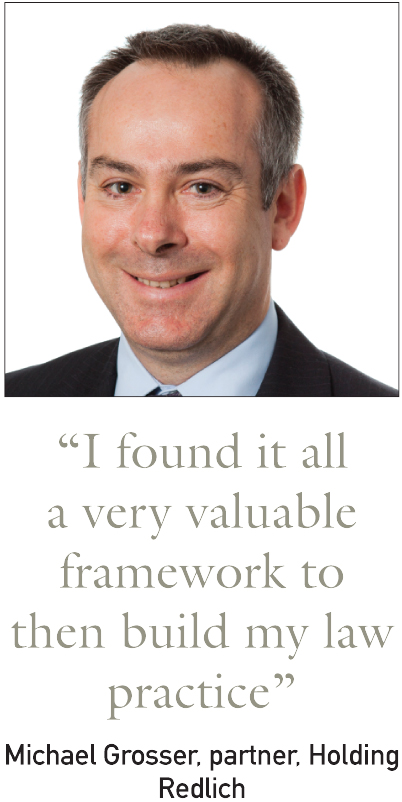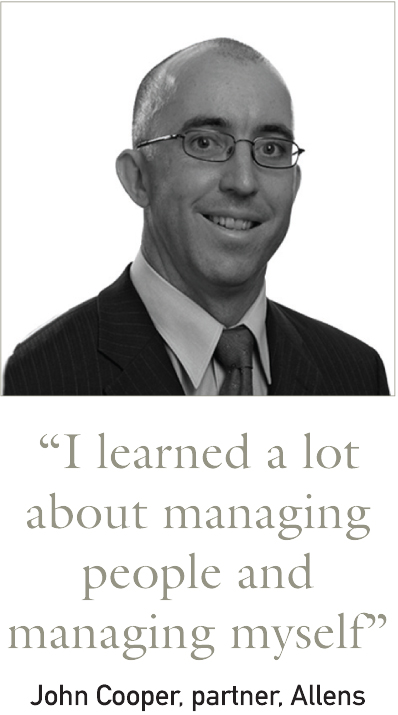Down to business
A lawyer may seem an unlikely candidate for a Master of Business Administration, but the reflection time and broadened skills can have long-term benefits. Stephanie Quine reports.

How well do you know yourself? How do you approach a negotiation? Are you comfortable with change? A Master in Business Administration (MBA) has gone some way to answering these questions for three lawyers who completed one at varying stages of their careers.
In the mid 1990s, Daniel Blue and Michael Grosser were studying part-time for an MBA at the University of Western Australia and the University of Adelaide respectively.
Blue had more than five years’ experience in major mergers and acquisitions law at the time, while Grosser was working for an information technology company.
“I was wanting to take on more responsibility in the company ... I wanted to learn a bit more about some of the things that I was starting to get involved in, whether it was HR or financial management, so that was what motivated me to do it,” says Grosser.
Blue, on the other hand, was particularly interested in enhancing his practice as an M&A lawyer.
“You can choose individual subjects [and] probably find areas where it helps in individual practices ... I picked a course in negotiation which taught me that a negotiation is a process and it taught me to understand what the other side wanted, to analyse what they needed to see if they could have a win-win situation,” says Blue.
Blue went on to gain a further 20 years’ experience as a senior lawyer and negotiator in major transactions in the UK, Canada, South Africa and Australia. He has advised clients across a range of industries, including resources, agriculture, transportation, energy, utilities and hospitality, and worked for top-tier firm Freehills for a number of years as a partner.
Grosser finished his MBA and started his own IT business, Catalyst Interactive, the next year.
He operated that for around eight years, took it nationally, and then internationally and then sold it.
“It was extremely valuable because I got a chance to put it all into practice,” he says.
He started studying law when he was running the business, and by the time he graduated and was working as a lawyer for DLA Piper he had an MBA and years of senior business experience with a company operating in the government and corporate sectors in Australia and overseas.
“I found it all a very valuable framework to then build my law practice,” he says.
“When you’ve been on the other side of the desk and it’s your house that’s been on the line month in and month out then it certainly gives you an edge in terms of an ability to empathise and understand the pressures that people are under in business.”
 Measuring success
Measuring success
Blue and Grosser both work as partners for Holding Redlich now. Grosser in Brisbane, in the corporate and commercial group, specialises in projects and infrastructure, IT and government procurement.
He has advised Commonwealth and state government ministers in small business, export and technology matters, and represented Australia at APEC summits and United Nations forums.
Blue has recently moved into a management role as head of Holding Redlich’s Melbourne commercial practice and co-head of the firm’s national energy and resources group.
His MBA learning on the softer skills of management – the ability to work with people and to strategise – will help him in this role, he believes.
Sydney-based Allens construction and infrastructure partner John Cooper certainly found this to be the case. He finished his MBA at the Australian Graduate School of Management (AGSM) around three years ago; at the time he was heading up Allens’ national projects group.
“I learned a lot about managing people and managing myself. I learned a lot about managing change and how to bring people along when trying to change things on client matters or something to do with the firm,” he says.
Some of these ideas were intuitive, but Cooper hadn’t come across them as clearly. The MBA, he says, gave him a framework within which to work and structure client meetings and interactions.
He now spends a lot of time at the start of a project talking about what it is that clients want to achieve, not just in a legal or documentation sense, but in the commercial sense.
“I work out what the criteria is by which they’ll gauge or judge success of the project ... and then sit down with [clients] and identify a possible solution for delivering or implementing the project,” he says.
As the process goes, they then rate each of those solutions against the criteria to come up with what they believe is the best solution.
“I’ve learned a huge amount about strategy and spending some time to try to understand what the fundamental objective is,” he says.
Managing people
Part of narrowing in on the best solution means considering the people involved in the process.
Often when managers decide something should change, they tell everyone at the organisation how it should change and ask them to implement it. The problem with that, says Cooper, is it can alienate people who will resist the change and even desert the organisation.
“To actually embark upon a very structured process of implementing change, what you do is go about reducing or removing the possibility of resistance by talking to people about it.
“Talking to as many people who’ll be involved in it as possible early on [will] help you identify the problem. Then have them work with you in developing possible solutions,” he says.
It may sound obvious, but an MBA helps makes it second nature to check in with how people are feeling and make sure that they’re on board.
Seize the day
Cooper and Grosser both admit they haven’t had as many opportunities to contribute to law firm management outside a management position. But at the time they were doing the course, there was ample opportunity to practice new skills.
“A lot of people going through with me didn’t have the management experience or didn’t have an opportunity to put into practice what they were learning and I don’t think it would be particularly valuable in that context,” says Grosser.
The best time for a lawyer to do an MBA, he thinks, is when they’re getting involved in management activities at the firm or immediately before they know they’re going to step into a partnership role.
Ironically, this could also be the worst time from a logistics and work-life balance perspective. Demands on a lawyer’s time increase significantly as they move into a partnership role, says Grosser.
But that’s part of the management skill you learn in an MBA, says Blue.
“I had a young family and a full partnership load and an MBA and you just learn to balance the needs of each one and get on with it. That’s one skill the MBA teaches you … to cope with competing requirements,” he says.
 Life-long learning
Life-long learning
Learning about yourself, which is another focus of the MBA, shouldn’t be underrated.
“You spend a fair bit of time actually looking at how ... you behave, you operate and how you can behave in the future,” says Cooper, adding that he’s derived a lot of benefit from knowing more about himself.
His AGSM course involved eight subjects and four ‘residentials’ in the strategic management year, which offered a chance to bond with fellow students and the course facilitators.
“You work very closely with [them] in that strategic management year because you’re locked away with them for four to five days at a time,” says Cooper.
These relationships are one of the best rewards of doing the course, the lawyers agree.
 “They won’t provide sort of immediate work but they provide long-term deep contacts in other countries,” says Blue, who’s still in touch with a businessman in Indonesia and one in America whom he said have proved valuable contacts when he visits those countries.
Whether they’re in the food industry, engineering, accounting and finance, legal or IT business, those studying for an MBA are usually like-minded people with an appetite for life-long learning.
“They’re motivated to get on and do things, they’re obviously very career-orientated ... so they were enjoyable to work with,” says Cooper.
Lawyers may not always be the best business people, but they understand business and some are particularly good with clients, which is ultimately the drive of a good lawyer.
While studying for an MBA will undoubtedly fill up a time-poor lawyers’ schedule, completing one may save them time in the long run and help them fast track solutions and achieve long-term success for clients and their firms.







